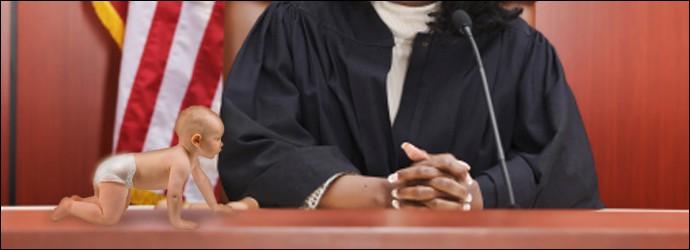 Too Bad We Can’t Trim Those…
Too Bad We Can’t Trim Those…
I cover a couple of recent cases in this post that couldn’t be about more divergent topics: diapers and malpractice.
First up is a dispute over diapers in which we ask, should what happens in a mediation be kept secret? Will we even find out the answer? Then we turn our attention to a malpractice case that’s wound up in a dispute over whether an inventor is qualified as an expert.
These questions may or not be answered by the Federal Circuit, so read on!
[Insert Dirty Diaper Joke Here ]
Kimberly-Clark Worldwide, Inc. v. First Quality Baby Products, LLC, No. 2011–1157 (Fed. Cir. Nov. 15, 2011) (Judges Lourie, Bryson, and Reyna) (non-precedential)
Privilege comes up a lot in litigation. In evidence, there are a number of privileges that allow a party to withhold information that it would otherwise have to turn over. The most often used is the privilege for attorney-client communications, but there are others. For example, there is (in some states) a marital privilege protecting communications between spouses, and some states recognize a privilege for journalists against revealing their sources. In each case, there are specific policy reasons for saying that we’ll protect information that would normally be discoverable.
Kimberly-Clark (I’ll refer to them as K-C) argued for a new privilege covering mediations. This makes some sense, as a privilege would encourage the parties to be completely honest with the mediator. But it’s never been recognized before.
Why would K-C want such a privilege?
Well, K-C had previously sued a number of companies for infringing its patents for disposable diapers, including Procter & Gamble (P&G). K-C and P&G entered an agreement laying out a procedure for arbitration.
When First Quality was sued by K-C, it sought the agreement and any materials relating to the proceedings. It seems likely that K-C was concerned that those materials would give First Quality information that would hurt K-C’s bargaining position in a settlement. (It’s not unusual for a patent owner to fight having to produce previous settlement agreements for just that reason.)
The procedure K-C and P&G agreed to involved a panel of arbitrators. Both parties would present their evidence and the panel would make a decision, although the decision wasn’t binding. Because the procedure was adversarial, the district court didn’t buy that this was a mediation, although it did agree that there should be a mediation privilege to encourage full communication with the mediator. It ruled that K-C had to turn over the materials.
The Federal Circuit agreed with the district court. The procedure looked like an arbitration, not a mediation. The fact that it wasn’t binding didn’t magically make it a mediation. But the court carefully avoided deciding (or even opining on) the existence of a mediation privilege.
You can read the court’s opinion. Should there be a privilege covering mediations?
Have Your Claims Been Trimmed Too Close?
Byrne v. Wood, Herron, & Evans LLP, No. 2011–1012 (Fed. Cir. Nov. 18, 2011) (Judges Lourie, Gajarsa, and O’Malley) (non-precedential)
Byrne has a patent on a guard for a wire grass trimmer, and he sued Black and Decker for patent infringement. He lost, and he apparently wasn’t too happy about it.
So, Byrne sued his patent attorneys for malpractice, arguing that they could have gotten him broader claims in the first place. He sued in state court in Kentucky, and the law firm removed the case to federal court on the grounds that the malpractice claim required resolving questions of patent law.
The law firm moved for summary judgment, arguing that it was clear from the history of the patent that the patent examiner wasn’t going to give Byrne the broader patent. Besides that, Byrne signed off on what the firm did. In his response, Byrne submitted an affidavit from a patent attorney and one from himself. His affidavit addressed the difference between his invention and prior art that was before the U.S. Patent & Trademark Office, as well as why he felt he should have gotten the broader claims.
The district court decided on its own that Byrne lacked ordinary skill in the art and struck his affidavit. Without that, there was no technical support for Byrne’s argument, and the judge granted summary judgment to the law firm.
The Federal Circuit vacated the judgment, mainly because the district court didn’t determine what the level of ordinary skill in the art was, so there was no basis for deciding that Byrne lacked it. Plus, the court noted that a sole inventor generally has at least ordinary skill in the art. (Otherwise, how could he or she have invented something new?)
There’s an interesting section in this opinion on jurisdiction. Typically, federal courts don’t have jurisdiction over legal malpractice cases. But, where deciding a question of patent law is required to resolve the claim, the Federal Circuit has generally said that there is federal jurisdiction. Two members of the panel (Judges Gajarsa and O’Malley) expressed their opinion that you don’t need federal jurisdiction in a case like this one, where it’s just a hypothetical question about a patent, rather than affecting real patent rights. They recommended that the full court address the issue.
The court’s opinion has more details. See what you think.

 Too Bad We Can’t Trim Those…
Too Bad We Can’t Trim Those…